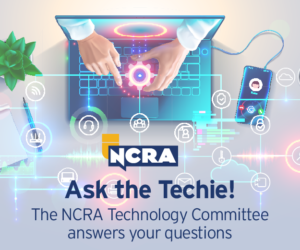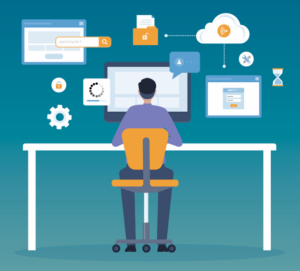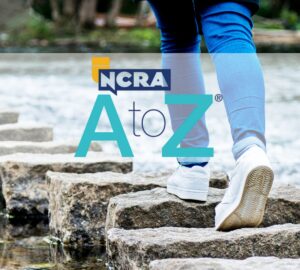By Nancy J. Hopp
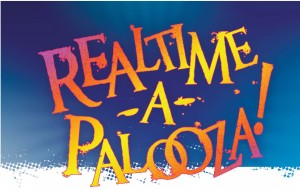 Despite widespread rumors of the demise of court reporting, Midwest Litigation Services, based in St. Louis, found itself early this year with way too much of a goo d thing: We had more realtime work than we had realtime reporters to cover it. The reporters we use are a very good, highly experienced lot; they can write like the wind and turn in beautiful, accurate transcripts. But they are prey to the same fears and lack of technical knowledge as are many other good reporters across the country. How could we provide them with the know-how and confidence they need to make the leap to realtime?
Despite widespread rumors of the demise of court reporting, Midwest Litigation Services, based in St. Louis, found itself early this year with way too much of a goo d thing: We had more realtime work than we had realtime reporters to cover it. The reporters we use are a very good, highly experienced lot; they can write like the wind and turn in beautiful, accurate transcripts. But they are prey to the same fears and lack of technical knowledge as are many other good reporters across the country. How could we provide them with the know-how and confidence they need to make the leap to realtime?
Planning what to teach
We decided that the answer to that question was to give our reporters all the tools and knowledge they would need to overcome their fears via a half-day seminar, a slimmed-down, hands-on version of NCRA’s Realtime Systems Administrator program. Our goal was to supply as much information as we could and answer every possible question so as to remove all conceivable barriers to writing realtime. We emailed the reporters, asking who would be interested in attending, hoping that we’d get half a dozen solid candidates. Imagine our delight when we received 27 positive responses!
But having a large, albeit motivated, group of students can present problems of its own, as people’s individual experience puts them at different spots on the road to realtime. Some need to work on further developing their writing accuracy; others can produce good rough drafts but lack realtime connection knowledge. We wanted to divide the respondents into smaller groups of people with similar skills and experience so that no one would be either bored or clueless, and so that we’d be able to provide more individualized attention. No prospective realtimer left behind!
To accomplish this segmentation, we had each candidate fill out a realtime capability survey, which elicited information about their average translation rate, knowledge of realtime browsers (software that attorneys use to view realtime), realtime equipment, and other similar measures.
We then assigned scores based on a point system: one point for being an NCRA member, one point for each realtime-related certification they’ve attained, one point for being able to provide a usable rough draft within an hour of adjournment, and so forth. Although a somewhat ham-handed, unscientific survey, it allowed us to assign a rough numeric score to each candidate that we could use in dividing the respondents into three groups:
- Beginner: For those who are thinking about realtiming but aren’t sure where to start;
- Intermediate: For those who have honed their writing style enough to step up to producing a usable rough draft; and
- Advanced: For those who are rough-draft proficient and ready to jump into the deep end of the realtime pool.
We then set the dates and we got to work on planning the first seminar, which would be geared to this last group: those on the cusp of hooking up for realtime.
Midwest Litigation Services is extremely fortunate to be able to draw on the talents of veteran realtime reporter Bill DeVries, RDR, CRR, as well as MLS video supervisor and resident tech guru Gene Miller, both of whom passed the Realtime Systems Administrator exam in record time. I had the honor of serving on the NCRA Realtime Systems Administrator Task Force, the group of realtime ninjas who developed the content and testing protocol for the Realtime Systems Administrator class and exam. That singular experience made me an even more ardent proponent of realtime education. All told, MLS has four employees plus a reporter subcontractor who hold the Realtime Systems Administrator designation.
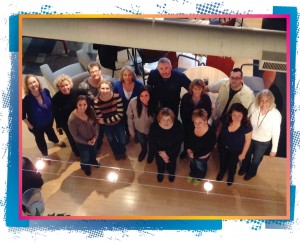
MIDDLE ROW: Becky Brewer, Tara Schwake, Ashley Huelsmann, Kim Ganz
FRONT ROW: Brenda Orsborn, Tammie Heet, Renée Wolf
Bill, Gene, and I brainstormed about precisely what the advanced group would need to know to get them over the realtime threshold, everything from writing tips to hardware and software to connection processes to comportment on the job — a veritable Realtime-a-palooza of information — and then put together a PowerPoint deck to guide the discussion.
We informed the beginner and intermediate groups that we would hold their class in conjunction with our annual reporter and videographer seminar, scheduled for two months later, and we continued planning the training for the advanced group.
Training the advanced group
The Saturday morning of the advanced seminar began bright and early, as a cadre of reporters from as far away as Springfield, Mo., and Central Illinois gathered at MLS headquarters in St. Louis. Hungry for realtime knowledge — as well as a light breakfast — they then made their way to a conference room where this in-depth training began.
We gave each reporter a thumb drive bursting with realtime-related information: NCRA resources, including COPE Realtime and Rough Draft Guidelines as well as TRAIN references, and a compilation of links to user guides, videos, and other helpful information regarding various CAT systems, realtime browsers, and connectivity.
Bill and Gene talked through assorted connection configurations and hardware options. The attendees received not only technology-specific info but also helpful facts and figures on buying iPads versus netbooks, refurbished equipment versus new, and routers versus Bluetooth, not to mention ballpark pricing for these options. In addition, attendees shared their own personal experiences with some of these products, all extremely valuable information that is difficult to find in one place on an individual basis.
We discussed the various realtime browsers and the features, benefits, and idiosyncrasies of each. Bill and Gene demonstrated the connection process for the most commonly used local and remote realtime applications so the attendees could see the actual connection screens as well as the realtime display on each.
Then the reporters broke into small groups according to CAT vendor so that they could share CAT system-specific knowledge of proprietary connection and browser features, as well as tips and tricks they had uncovered themselves, with others of their tribe.
After a morning full of great questions and answers, the reporters left with a box lunch, a thumb drive packed with manuals and other resources, and a much greater understanding of realtime technology to help spur them forward in their careers.
The high level of interest in the topics discussed was palpable, and we were thrilled to receive rave reviews on the program: “Very good!” “Very informative!” “It was all awesome!” “I just want Nancy Hopp to know I walked out of there with more knowledge from those four hours of training than I’ve ever received in any of the all-day seminars I’ve attended over the past 27 years. I not only left with knowledge, but I left feeling inspired.” In truth, however, it was Bill, Gene, and I who were inspired by the reporters’ enthusiasm and thirst for knowledge.
High fives to Ashley Huelsmann, RPR; Brenda Orsborn, RPR; Christine Richele, RPR; Karen Keim, RPR, CRR; Kim Ganz, RMR, CRR; Paula Voyles, RPR, CRR; Rebecca Brewer, RPR, CRR; Renée Wolf, RMR, CRR; Tammie Heet, RPR; Tara Schwake, RPR, CRR; and Tracie Brumley for giving up a precious Saturday morning to expand their professional capabilities.
Beginner and intermediate level training
Armed with this experience, we then prepared for the realtime sessions at our upcoming annual seminar. When we explained to the beginning and intermediate groups that it would be a few months until we tackled their training session, we provided them with links to a wealth of realtime-related information available on NCRA’s website – including the invaluable TRAIN guides – so that, in the meantime, they could begin on their own to focus their efforts on polishing their skills and increasing their knowledge. And, of course, we also included information on NCRA’s flexible monthly annual dues billing option for any who either weren’t members yet or who wanted to spread the NCRA love.
To better accommodate all attendees, we decided to combine the beginner and intermediate realtime sessions into one that encompassed both a steno swap and a discussion of more advanced writing techniques, with Bill again displaying his lovely steno writing.
Somewhat unexpectedly, the session evolved into a more realtime-specific discussion, where practical questions arose, such as what to do when you’ve clearly misstroked something in realtime, and other scenarios that pop up in the real world. We easily filled the time slot with this exchange as more and more questions came to the fore.
A technology seminar presented by our IT consultants was scheduled to follow this session. To further demystify realtime technology, however, we announced that Bill would be available in another room to walk through the realtime hookup process with anyone who was interested in getting hands-on experience or even simply observing. Imagine our surprise when almost everyone in the room got up to attend Bill’ session! We had to ask people to attend the sessions in shifts, again to allow for smaller instructional groups and to make sure the IT consultants wouldn’t be playing to an empty room.
The seminar evaluations revealed that the steno swap/realtime session and hands-on connection demo were, without a doubt, the most popular sessions of our annual event. Comments included, “If I could check double awesome, I would. This was incredibly valuable to me and also a lot of fun! I am really looking forward to putting what I learned from Bill into practice as soon as possible!” “Extremely beneficial! So nice to be able to see and learn things hands-on.” “I think it got some squeamish reporters thinking they can give realtime a try.” “I enjoyed this the most! Bill is a great presenter and made the whole thing seem very easy and even doable.” “Makes me definitely want to work harder toward achieving realtime.”
Keeping the momentum going
To keep the learning momentum going, we have since followed up by dispersing realtime-related information through email blasts. Topics have included NCRA’s recent posting of CAT system-specific videos on YouTube and other tidbits of interest.
The reporters who cover work for MLS are one of our greatest assets, and it has been so rewarding to us to be able to give them the knowledge and tools they need to up their game. We thank all those who attended and allowed us to spread the word – as well as the love – of realtime.
Nancy J. Hopp, RDR, CRR, CMRS, is a Realtime Systems Administrator and chief operating officer at Midwest Litigation Services, based in St. Louis. She can be reached at nhopp@midwestlitigation.com.





